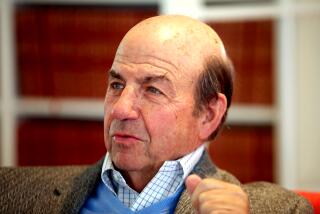Book Review : Author Krupnick Takes Inventory of Humanities
- Share via
Lionel Trilling and the Fate of Cultural Criticism by Mark Krupnick (Northwestern University: $21.95, hard cover; $10.95, paperback)
Lionel Trilling was one of the first Jewish scholars in the humanities to gain tenure at a major American university. Though the gates of Columbia University were reluctantly opened to its former student in the 1930s, by the time he died in 1975, Trilling’s renewal of the humanist tradition had brought international recognition to his alma mater and a host of honors and awards to its foremost spokesman.
Trilling’s cultural criticism took its cue from Matthew Arnold, whose achievement formed the subject of Trilling’s doctoral dissertation, which was published in 1936 and remains an important work in the field. Like Arnold, Trilling held to an ideal of “disinterestedness” and its corollary, the steady view of the whole despite constant demands from all sides that he embrace only one view. Mark Krupnick’s is an important book because it “is about the difficulty that criticism has experienced in trying to work out a synthesizing perspective on literature and society. . . .” He reminds us of the effort needed for such an enterprise, for the art of criticism, in Trilling’s own words, is practiced at “the dark and bloody crossroads where literature and politics meet.”
Importance of Ideas
Throughout his career, Trilling insisted with enormous subtlety, learning and intellectual skill that ideas matter, while reminding us that their force and value depend always on “the conditions”--alluding thus to the political, economic, and social context of the prevailing dispositions of power. Krupnick’s book maps the nuances of Trilling’s thought with insight and a fine historical understanding. Thereby he reminds us that Trilling was the guide for two generations of Jews who left the dialectics of their religious house of study, the Beit Midrash, for the struggles of the academy. Exchanging the exegesis of their sacred texts for the criticism of the high precincts of Western art, they elaborated new possibilities for both.
This book is also a challenge hurled at those contemporary schools of criticism that give primacy to the codes of language, class and power. Their account closes the book of culture and opens the armory of revolution. In his analysis of Trilling’s practice--”the rhythm of man thinking--and usually thinking against himself”--Mark Krupnick provides an inventory of what they often choose to forget.
More to Read
Sign up for our Book Club newsletter
Get the latest news, events and more from the Los Angeles Times Book Club, and help us get L.A. reading and talking.
You may occasionally receive promotional content from the Los Angeles Times.










